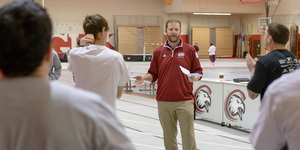Exercise science option grows in popularity

CHADRON – Increased interest in physical fitness is one reason behind the rapid growth of the exercise science option in the sports and recreation management major at Chadron State College.
That’s the assessment of Dr. Willie Hoffman, an associate professor in CSC’s Health, Physical Education and Recreation (HPER) department and the instructor for most of the college’s specialized exercise science classes.
“I think it’s the renewed fitness craze, where people are really going into that,” Hoffman said of the increasing enrollment in CSC’s exercise science classes. “It’s a good problem to have. It’s unbelievable how fast it has been growing.”
There are also indications that years of cutbacks in K-12 school PE courses are starting to be reversed, Hoffman said.
“Hopefully (PE) is going to start growing now that it has been named one of the core courses,” he said.
The numbers in CSC’s exercise and sports related courses in the last several years illustrate the field’s growth, according to Hoffman. A few years ago, the sports and recreation management major had about 20 students. Now, there are over 100, with exercise science the leading choice among the three options offered, he said.
There is plenty of science in the courses that Hoffman teaches.
“In exercise physiology we look at how the body works when exposed to different types of exercise, (beginning at) the cellular level, with how energy is produced,” he said. “We look at things like how exercise is affected by temperature, by altitude, the differences between males and females, and age differences.”
Biomechanics, another class in the program, delves into topics such as the aerodynamics of flying objects like a javelin or discus, said Hoffman, a former track and field student-athlete and coach at CSC.
“There is quite a bit of physics principles involved,” he said.
Other classes include motor movement, nutrition, and strength and conditioning, but the field is people-oriented, so students also take subjects like leadership and event management, Hoffman said.
“You end up working with people and a lot of hands-on experience,” he said.
Exercise science attracts students with a variety of career goals, according to Hoffman. Some intend to coach and teach PE, while others aim for certification in specific coaching fields or advanced degrees in subjects such as physical therapy or human biology.
There is also a growing demand for personal trainers, and CSC recently added an essentials of personal training class, Hoffman said.
“People are hiring personal trainers to get them in better shape,” Hoffman said. “Parents are hiring them for their kids.… It’s a growing field.”
The department has expanded other class offerings to meet the demand. The exercise physiology and biomechanics classes are now offered in both semesters of the school year, and the classes are full, Hoffman said.
While many HPER graduates go on to teach and coach at the high school level, others have gone into collegiate coaching, or work at private gyms and fitness centers.
“We are getting more and more graduates out there. It’s going to be interesting to see in the next couple of years where they get placed,” he said.
Although interest in fitness has grown, the country continues to struggle with high levels of obesity, increasing numbers of diabetics, and other problems related to lack of exercise, Hoffman acknowledged. Excessive computer usage, fast food and cutbacks in K-12 PE classes are among the contributors to these problems, he said.
But concern about those problems may spur continued interest in exercise science and related subjects.
“People are trying to reverse that. That’s why our programs are becoming more and more popular,” said Hoffman.
Teaching exercise science is enjoyable, Hoffman added.
“It’s fun because there are so many different aspects to being physically active,” he said. “You have to have a lot of knowledge in a lot of areas. You never get bored with it because there is always something new.”
Category: Campus News, Health, Physical Education, and Recreation

